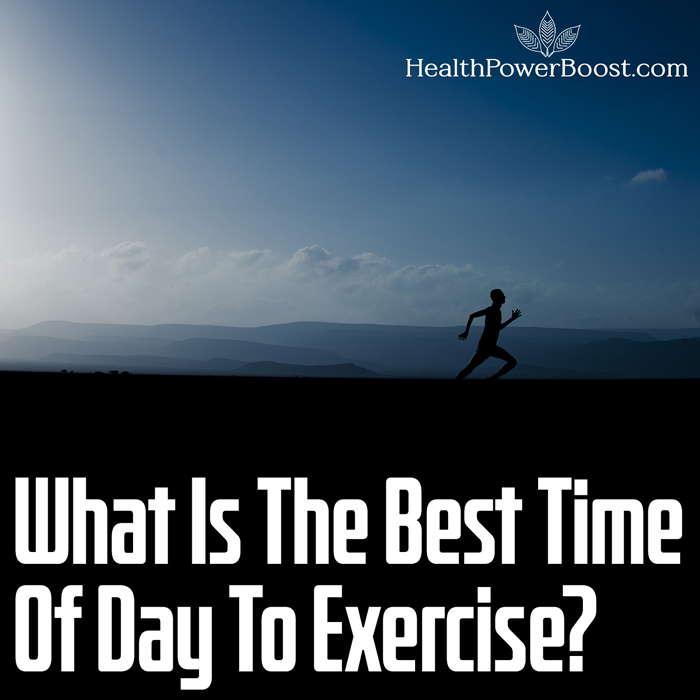This website is not medical advice. Posts may contain affiliate links from which I earn commissions at no additional cost to you.

What Is The Best Time Of Day To Exercise? Graphic © healthpowerboost.com. Background photo: Pixabay (PD)
One of the healthiest lifestyle habits you can take up is regular exercise. It’s no surprise at all to learn that the World Health Organization (and the medical and scientific community) agrees: Regular physical activity has been proven to help prevent and reduce the risk for non-communicable diseases such as heart disease, stroke, diabetes, and even cancer. [1] Despite this being common knowledge, in the United States for example over 60 percent of the adult population do not meet the daily requirements for physical activity in order to stay fit and healthy. [2]

What Time Of Day Should You Exercise?
You would think that exercising in the morning before school, work, or other activities, is the best time to engage in physical activity. However, recent studies have focused on the benefits of late-afternoon or evening exercise over early morning routines.
According to a study published in the Journal of Strength and Conditioning Research, has reported that exercising later in the day is more beneficial than in the morning. [3] Researchers Hamdi and Nizar went into detail about why and how this afternoon and evening physical activity benefited our bodies more, focusing on the body’s circadian rhythm, core body temperature, and even blood pressure.
The researchers discussed how core body temperature and muscular activity were higher later in the day, lending to better results after physical exercise. In fact, they reported that muscular activity was better in the afternoon independent of core body temperature, with test subjects using their muscles more in the afternoon compared to the morning. This can be due to the typical ADLs (activities of daily living) performed earlier in the day basically acting as your “warm up” for the actual exercise.
The study also mentioned how blood pressure played a role, reporting that there was a typical surge or increase in blood pressure early in the day, which may contribute to a sudden cardiac event if you perform high intensity exercise in the morning. If you have a heart condition, exercising in the afternoon maybe a better choice for you.

Types Of Exercise And Time Of Day
The same study further discussed different the types of exercise and how the time of day affected their results, specifically aerobic and resistance training.
Aerobic exercise is great for cardiovascular conditioning, with the American Heart Association recommending 30 minutes of cardiovascular exercise 5 to 7 days each week to keep your heart in shape. [4] Hamir and Nizar reported a study where after 6 weeks of training, the subjects had increased their anaerobic threshold in the morning for the morning exercise group and in the afternoon for the afternoon exercise group.
The anaerobic threshold is the highest sustained intensity of exercise that uses oxygen when doing physical activity. This meant that whether you exercise in the morning or later in the day, you will definitely benefit from the activity. However, another study they reviewed showed that people who exercised in the evening were able to adapt better to various physical activities and were able to exercise more compared to the morning group – something to think about in the long run if you exercise regularly.
Resistance training on the other hand was not time of day dependent, the researchers found. If you performed resistance training in the morning, the benefits were better in the morning. If you exercised n the afternoon, the benefits were better in the afternoon. They suggested that if you were training for a specific event, timing your resistance training to the actual time of the event (such as a race or a competition) would be your best shot.
Should You Fast Before Exercising?
A study published in the Journal of the International Society of Sports Nutrition reported that fasting before exercise or having a hypocaloric meal beforehand had no significant difference when it came to weight loss. [5] There were twenty health females involved in the study who were separated into two groups – a group that exercised after an overnight fast and a group that had a meal prior to exercising. Both groups were on the same hypocaloric diet and underwent nutritional counseling to ensure they stayed on the diet. While both groups were able to lose weight after four weeks, the difference between the two groups was not statistically significant.

The same results were seen in a study that involved overweight women who underwent 18 sessions of high intensity training (HIT) and were also separated into fasting and non-fasting groups; there was no statistically significant difference between both groups’ weight loss. [6] These studies show how losing weight was more dependent on a hypocaloric, healthy diet coupled with regular exercise than fasting.
Does Exercising In The Evening Affect Your Sleep?
One concern among people who exercise is if physical activity late in the afternoon or evening could potentially disturb their sleep. This is a valid concern and research has shown how exercising in the afternoon or evening could actually help you sleep than hinder it.
A systematic review published in 2017 reported that out of 34 studies they included, 29 reported that exercise helped improve sleep quality. [7] In a study that involved 11 healthy young adults, the results showed that vigorous, late-night exercise did not disturb sleep quality. [8] On the other hand, older adults reported that low-intensity aerobic exercise in the evening improved their sleep quality compared to morning exercise. [9]
Overall, exercise is something very personal and it ultimately depends on your lifestyle and what works for you. Remember, the best type of exercise is one that you can maintain regularly; and if exercising in morning works best for you then go for it. However, science has spoken, and if you are more interested in the benefits that exercise can give you, give working out in the afternoon or evening a try. Don’t forget to keep a healthy diet while you’re it! The best results are seen when you exercise regularly and eat right.
=====================================================
References:
[1] World Health Organization. Physical Activity. https://www.who.int/news-room/fact-sheets/detail/physical-activity
[2] Centers for Disease Control and Prevention. Physical Activity and Health: A Report of the Surgeon General. https://www.cdc.gov/nccdphp/sgr/adults.htm
[3] Hamdi, C., & Nizar, S. (2012). The Effect of Training at a Specific Time of Day. https://journals.lww.com/nsca-jscr/Fulltext/2012/07000/The_Effect_of_Training_at_a_Specific_Time_of_Day_.33.aspx
[4] Cleveland Clinic. Aerobic Exercise. https://my.clevelandclinic.org/health/articles/7050-aerobic-exercise
[5] Schoenfeld, B., et. al. (2014). Body composition changes associated with fasted versus non-fasted aerobic exercise. https://jissn.biomedcentral.com/articles/10.1186/s12970-014-0054-7
[6] Gillen, J., et. al. (2013). Interval training in the fed or fasted state improves body composition and muscle oxidative capacity in overweight women. https://onlinelibrary.wiley.com/doi/full/10.1002/oby.20379
[7] Dolezal, B., et. al. (2017). Interrelationship between Sleep and Exercise: A Systematic Review. https://www.ncbi.nlm.nih.gov/pmc/articles/PMC5385214/
[8] Myllymaki, T., et. al. (2011). Effects of vigorous late-night exercise on sleep quality and cardiac autonomic activity. https://pubmed.ncbi.nlm.nih.gov/20673290/
[9] Seol, J., et. al. (2021). Distinct effects of low-intensity physical activity in the evening on sleep quality in older women: A comparison of exercise and housework. https://pubmed.ncbi.nlm.nih.gov/33232794/
😳 What Tinnitus Does To Your Brain Cells (And How To Stop It)
After 47 years of studies and countless brain scans done on more than 2,400 tinnitus patients, scientists at the MIT Institute found that in a shocking 96% of cases, tinnitus was actually shrinking their brain cells.
As it turns out, tinnitus and brain health are strongly linked.
Even more interesting: The reason why top army officials are not deaf after decades of hearing machine guns, bombs going off and helicopter noises…
Is because they are using something called "the wire method", a simple protocol inspired by a classified surgery on deaf people from the 1950s...
★ Does Your Salad Contain This Vegetable?
★ Try This 100% Natural Essential Oil Mix For Nail Fungus:
★ I Can't Help Showing This Off:
If you haven't heard of Claude Davis yet do yourself a huge favor and watch this video.
One of the smartest guys I ever had the pleasure of meeting, Claude set-up a unique prepping system that changed his life forever.
I already tried it myself and let me tell... you I was completely blown away... His surprising tactics could make your life easier and give you the peace of mind you deserve.
Don't just take my word for it... watch his short video and decide for yourself.








